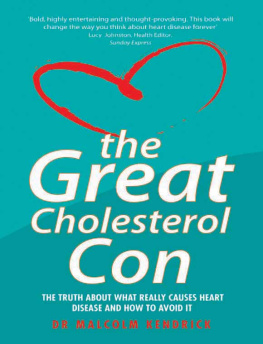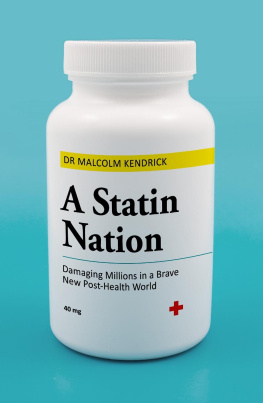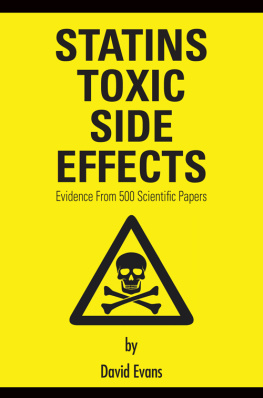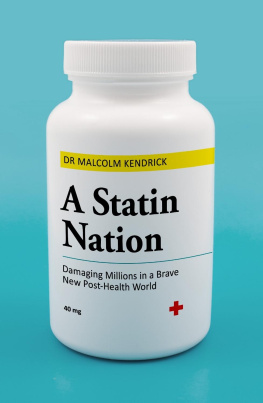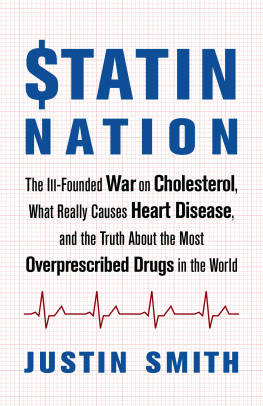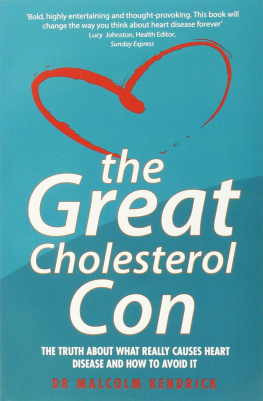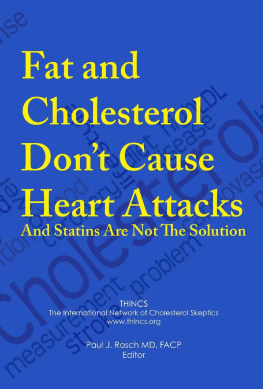



Statins: Miraculous or Misquided?
Copyright 2013: Mark J. Estren
ISBN: 978-1-57951-178-4
Published by
Ronin Publishing, Inc.
PO Box 22900
Oakland, CA 94609
www.roninpub.com
All rights reserved. No part of this book may be reproduced or transmitted in any form or by any means, electronic or mechanical, including photocopying, recording, or by any information storage and retrieval system, without written permission from the author or the publisher, except for the inclusion of brief quotations in a review.
Production:
Cover: Brian Groppe
Book design: Beverly A. Potter
Editor: Beverly A. Potter
Credits:
Illustration on page 14 courtesy National Institute of Diabetes and Digestive and Kidney Diseases
Photo on page 17 is by Bill Branson, courtesy National Cancer Institute
Library of Congress Card Number: 2013935202
Distributed to the book trade by PGW/Perseus
Acknowledgments
I t was my father, Solomon Estren, M.D. (1918-2010), who instilled in me a love of medicine and fascination with the functioning of the human body and the many ways in which its delicate balance is both a wonder and a vulnerability, so easily can it be disturbed. A pioneer in studying the metabolism of vitamin B12 and folic acid, translator of Tannhausers Textbook of Metabolism and Metabolic Disorders, Dad spent more than 50 years in the Division of Hematology and Medical Oncology at The Mount Sinai Medical Center in New York Cityand also maintained a thriving private practice in which he was the only doctor. Between being a solo practitioner, making house calls and having a marvelously empathetic bedside manner, he was a complete throwback to an earlier, idealized time of medicine that never really existed. He made it real, though.
He also was co-discoverer of Estren-Dameshek Syndrome, a variation on a rare congenital genetic abnormality called Fanconis anemia, in which bone marrow does not produce blood cells properly. Many patients with Fanconis anemia have physical abnormalities such as scoliosis, missing or extra thumbs, a small head and short stature. Some, however, have no physical abnormalities or deformities. They have Estren-Dameshek Syndrome.
Although my early study of medicine did not lead me to a career as a physicianI became a psychology and English Ph.D.my sense of wonder and excitement about the human body and its functions has never diminished, and as a result, writing about health and medicine has been a prominent part of my life for more decades than I care to count. For all that, Dad, thanks.
Other Books
by Mark J. Estren, Ph.D.
A History of Underground Comics
Question Authority to Think for Yourself
Prescription Drug Abuse
Note for Reader:
The information, analysis and advice in this book is not intended to replace the services of a physician. This material is provided for informational purposes only and is not a substitute for professional medical advice. Do not use the information in this book to diagnose or treat any medical or health condition or to make any changes in your medications or other aspects of medical care. Always consult your doctor and/or other health professional for any significant issue involving your health.
Table of Contents
H omer Jackson didnt feel quite right. Something was a little off. He was used to the feeling of being overweight, but hey, 205 pounds wasnt all that heavy for a five-foot-nine-inch man. Lots of his friends weighed more. This wasnt a weight thing, though. It wasnt a breathing issuesome of his friends had them, but he didnt. And it certainly wasnt his heart. Homer felt good about his heart. Hed been taking a drug called Zocor80 milligrams every day, just as the doctor said he shouldand he was careful not to miss a dose. He knew this was a powerful drug, a statin; hed even Googled its exact name, simvastatin. He knew it was doing its job silently, 24 hours a day, protecting him against heart disease. Several of Homers friends had already had heart attacks, but Homer was protected. He was 54 and had every intention of sticking around to 94. At least.
But something wasnt right. Homer checked to be sure he hadnt missed a dose of Zocorno, he was up to date. Hed missed exercisingwell, he didnt really exercise much, so that was nothing new, and that wouldnt explain why he felt so, well, weak. His muscles hurt, as if he had in fact been exercisingthey were tender. That didnt make sense. He had a desk job. Nothing there to tire him out and make him feel so run-down. Maybe he had a touch of the flu, or something. It would pass.
A week later, it hadnt. Homer was feeling worse. He was tired all the time now, had trouble dragging himself out of bed, wasnt sleeping well even though he kept wanting more sleep. I ought to call the doctor, he thought, but what am I going to say? That Im tired? Everyone is tired. That I feel weak? Well, I really ought to exercise and build up my staminathe doctor has told me that before, and I dont want to get into an argument. Im busyI dont have time to exercise. And my statin is protecting my heart. Sure, it would be better if I exercised as well, but Im pretty much okay as is. Just weak.
The muscle pains were worse a week later, and Homer felt stiff and sore all the time. It didnt make any sense at allhe was having the aftereffects of an intense workout without the benefits. And when he went to the bathroom, he saw something else. His urine was a brownish-red colora lot darker than usual. Not drinking enough, he thought, and started keeping a liter bottle of water at his desk all the time and sipping from it throughout the day.
By a week after that, Homers co-workers were noticing that he seemed exhausted all the time and was moving as if in pain. His urine color hadnt changed if anything, it was darker. Homer felt so weak that he could barely function, and he knew it was time to call his doctor, even at the cost of being reprimanded again for not exercising and relying on statins for heart health. He gave in and phoned.

To Homers surprise, the doctor wanted to see him immediatelythe next morning. Now Homer was actually alarmed: it usually took weeks to get an appointment. He managed to drag himself out of bed and get to the doctors office, where he felt like collapsing. And thats where Homer got the news: his statin, on which he was relying for a long and healthy life, was killing him.
Next page

